#moffat praise
Text












Romantic Reverie
Our Girls: Poems in Praise of the American Girl by American artist and illustrator Howard Chandler Christy (1872-1952), with black and white and color illustrations by Christy and poems by a variety of authors, expressing turn-of-the-century attitudes towards the American Woman, was published in 1907 by Moffat, Yard & Company in New York.
Christy, who initially garnered notice as a combat artist of the Spanish-American War of 1898, was famed for his “Christy Girl,” confident, independent, elegant, and witty, a figure that significantly influenced the societal perception of women. His depiction of the American feminine ideal is often viewed as the “colorful and illustrious successor” to the well-known “Gibson Girl” that embodied the ideal of a romantic, attractive society woman.
Christy's continued reputation and fame led to commissions for the war effort during WWI and portraits of notable American and world figures, leading Time magazine in 1938 to proclaim him as "the most commercially successful U. S. artist."
View our posts on The Gibson Girl.
-Melissa, Special Collections Graduate Intern
#our girls#poems in praise of the american girl#howard chandler christy#moffat yard and company#american girl#christy girl#american artist#illustrator#society girl#society woman#love poems#romantic
59 notes
·
View notes
Text
Masters, coyotes and reset buttons
Ok, so this has been going after me for a few months now and probably won't end up as coherent as I'd like it to, but this is also a warm up for finally fixing that stupid article that everyone tells me is good but has been halted by journal paperwork since 2020, so... As always, because there be salt, putting everything under a cut.
There's been this debate on whether the Master should be given a break from appearing for a while and, as always, it's usually taken somewhat hostile as an attack on the character or a particular actor (which. look if this was about acting skills BBC should have never moved from sir Derek Jacobi, period). And I would say the problem lies entirely elsewhere. Namely, circularity vs. linearity.
There has always been a mythical or commedia dell'arte element to the whole concept of regeneration, an archetypal thing in characters going by titles as names and having a certain set of characterisics and narrative functions that go along with those. Hell, commedia dell'arte even has a literal "Il Dottore" whose whole thing is embodying science and education - more often than not mockingly. When you employ Zeus rather than Poseidon in your story that's probably because there be weird sex rather than disproportionate fury. When you choose a paladin class in your rpg that's because you're going to have different skills and make different choices than if you were a rogue. Galahad and Lancelot will go on completely different journeys of nunnery/brothel and rescuing a prince from forced marriage even while they both seek the Holy Grail. When you want your children to have different properties you'll use your mantra to invoke four different gods.
The thing about archetypes, though, is that they are, literally, timeless. Or better yet, outside of time. But stories, narratives are, by nature, linear and timed. There's the beggining, the middle and the end. And of course, the whole fun is toying with the archetype, tweaking and reinterpreting them in specific contexts and stories. And DW has been doing a phenomenal job of it throughout its history, even if occasional nitpicks can be made. Classic Who was perhaps more circular and repeating in its storytelling and - sorry, posession by Marshall McLuhan - this makes sense in a medium where a story airs just a couple of times. There were arcs for each Doctor, though significantly more so for companions. NuWho became much more clear in this, but still mostly managed to keep a neat balance between the timelessness and timeliness.
Take the Saxon's story, which is what kickstarted me spilling here. Not to come off as a canon snob, but I think if he was an introduction to the character it may not be clear just how shocking him dying on the Valiant was. This is the character that was a skeleton, a gooey body snatching snake and a cat to go on living, and has been the Doctor's prisoner, in fact begging them to save them. Ten is 100% justified in his assumption that he'd never kill himself. His death introduced a major shift to their dynamic, especially when framed as fuelled by hatred. The finale in EoT is largely a return from this shift. No, the Doctor didn't only care for the Master because he wanted another Time Lord. No, the Master doesn't wholeheartedly hate the Doctor. They can and will always cooperate when there's a common enemy. As has been the case throughout all of Classic Who.
Enter Moffat era. Now, it's a bit of a cliche to say Moffat is a better episode writer than showrunner, but it being cliche does not make it incorrect. His poetic definitely works better when there's an ending, a specific goal in sight. In singular episodes this works like a charm. It worked terrifically in season 5. But later on there definitely came this element of "keep watching, because this is all heading somewhere, trust me". And all too often the answer was proving less interesting than the question. This was particularly clear in seasons 7-9, with return to Gallifrey being hyped up repeatedly, only to fianlly fall flat. And I guess Moffat realised that and decided to go for a soft reboot in season 10.
Which brings me to Missy and redemption arcs. Now, in our completely not puritan era there's way too much talk of whether characters deserve redemption, and what would account for a redemption, and how that differs between different legal systems, and too little appreciation that redemption narrative is as linear as they get. You get the starting point of sin and have a clear goal of that sin being repaid or undone. Sure, you can dig into that, and question that, and reinterpret that, and cynically cut that, but it always relies on that clear line. And it's obvious that Moffat was aware of how linear he wanted Missy, and indeed the Master in general, to be. The fucking text says that: "where we've always been going". The disagreement is only what that where is. Now, if the story was meant to be lieanr, then it really does make infinitelly more sense to view the events of EoT as a turning point in the thoschei relationship, but the story explicitly shuts that down. Nah, it was more infitely more important to have the initial sin embodied to be killed in the ultimate act of redemption. #symbolism
A slight tangent here. I know that the original plan for Delgado!Master was to have a redemption arc where he sarcifices himself for the Doctor, so I guess it can be argued this was indeed where the story was going all along. But things turned out how they did and people generally don't introduce Moriarty into their sherlockiana to have no actual screentime (literal or metaphorical), as was the original plan.
Aaaand then there's Spymaster. I've seen dozens of explanations of why he is the way he is, and whether that follows logically from Missy's story or not, and whether he might be before her, and whether he undoes her redemption, and blah blah, but the bitter truth is: Chibs hit the reset button. He hit it hard. No, we are not meant to keep in mind the events of s10 when we analyze the spydoc relationship. Again, a comparison to Moffat explicitly bringing up the events of EoT with Saxon, if only to brush them aside as meaningless for both parties. More importantly, if those were meant to affect Thirteen's hostile attitude towards the Master, then she shouldn't have been so shocked with his appearance. She might be surprised he regenerated, but like the whole reason for bitterness over being abandoned would go along with the expectation the Master did survive, that's why they left Twelve in the first place ffs. So, it would look like Chibnall tried to go back to a circular status quo after a linear redemption, and that's certainly what the writing thinks it's doing. Except now that the whole TTC can of worms has been opened, the relationship is deeply imbalanced. Imbalanced in a way that cannot be easily undone. Like, I know the fandom is trying to frame the Master's sense of inferiority as somehow mistaken and fanon!Thirteen certainly thinks so, but that's not what the text is saying. There is a misundertanding going on here, but a misunderstanding that goes on unresolved gets tiresome and frankly masochistic pretty fast. Either the Master should get to the point of understanding that the Doctor is not inherently superior to them because of past or magic of friendship and that they're Kenough, or accept the Doctor as their lord and saviour and martyred god who died so they may live and spend the rest of their days as a lapdog. Which, I understand the fandom may enjoy, but doesn't make for a very exciting story. So yes, there's definitely a linear narrative going on here. One that does need some time in a fridge and exposition of how the Doctor themself feels about their relationship before the character is brought back. Right now we are not in the The clown always gets up again, no matter how often he has been knocked down paradigm only No clowns were funny. That was the whole purpose of a clown. People laughed at clowns, but only out of nervousness. The point of clowns was that, after watching them, anything else that happened seemed enjoyable. It was nice to know there was someone worse off than you. Someone had to be the butt of the world.
Butbutbut, of course, what about Ainley!Master being brought back again and again seemlessly? That's just the thing - Ainley!Master existed in a completely different poetic. He was purely circular. He was the most circular of the Masters. He was as circular as you can get without actually being a cartoon coyote who only falls down when he realises he's midair. I'm not entirely ironic here - there is an inherent trickster element to the Master as a character! Perhaps more Goethe's Mephistopheles that Native Americans' Coyote, but between constanct scheming, shapeshifting and falling into the pits they've dug the elements are all there. And a trickster either endlessly travels between Olympus, Earth and Hades or gets killed by Heimdall.
And before a gotcha of me insanely hoping for a Saxon cameo either in the 60th anniversary or, that being off the table, somehow meeting Fourteen - yeah, in an anti-linear bubble. I've seen speculations that RTD wants to do another soft reboot, hence there's no knowing what Master will pop out of that tooth. As far as I wouldn't like it to be one of pre-Delgado Masters and for the record I wouldn't mind if it is Spymaster!, there's definitely something to the idea there's a soft reboot in The Giggle, with the Doctor "going home". Because you don't necessarily want to know what Odysseus' tax policies were once he reached Ithaka, but you do want to know that he's been a year on Circe's island.
#ok down to the article#doctor who#doctor who meta#dw meta#the master#the doctor#thoschei#philosophy in doctor who#have i come across as praising rtd in comparison to moffat and chibnall?#yeah maybe i generally think he did have the best grasp on what he was saying#tw: negativity#minor? yeah i'm critical
27 notes
·
View notes
Text



they're so obsessed with saying things casually like they don't contain enough devotion to level a city
#twelve will do ANYTHING if he thinks she'll praise him... moffat im in your walls but at least THIS works in my favor#dw lb#OKAY cant watch any more tonight
11 notes
·
View notes
Text
ohhhh my god you guys will see someones most performative horribly written activism and eat it up wont you its sooo surface level im begging you people to think
#moffat crit#i really. Did not like the new episode and i dont understand thr praise its getting.#esp compared to what rtd wrote
1 note
·
View note
Text
impossible planet + satan's pit such goooood dw episodes. ive seen fake gods and bad gods and demigods and would-be gods but out of all that out of that whole pantheon if i believe in one thing just one thing i believe in her!!!!!!!!!!!!!!!!!!!
#two of the best episodes of the series imo. and lowkey its so SCARY but done so well#and you really really care abt the characters ..at least i do T__T like it HITS when they die#and dw can be so monster of the week that its hard to become that attached to the one/two-off characters#and i hate to praise the moffat seasons bc rtd is objectively in almost every way a better era of the show. but the moffat episodes#very broadly speaking do a better job at that specific thing.. having the non-recurring characters be memorable
2 notes
·
View notes
Text
incredible how one good episode will make people forget that Moffat is a raging misogynist
#not tagging this I trust my audience to find me#I liked Boom as well but why are we suddenly singing this man's praises#like I understand we're all excited about war and capitalism and blind faith being the textual villains of the episode#but we've been doing that since before Moffat's era and we did it after his#I am no Chibnall fan but why are we acting like his run didnt have this kind of thing in it
1 note
·
View note
Text
the tenth doctor was so out of character in the girl in the fireplace its painful, the past mentions of him being with other girls throughout history when all his previous incarnations were pretty definitively asexual and aromantic, was SO PAINFULLY moffat. of course the doctor has shacked up with histories hottest and most powerful broads, thats what moffat would do with a time machine after all! the doctor never once expressed interest of a sexual desire with rose, he simply loved her, and yet not only does he "dance" with madame pompadour, but he meets her as a child, only to meet her again with her having completely fallen for him as an adult! when to him its been 2 minutes! all because moffat was read the time travelers wife once and became fixated on the plot point of meeting a woman you'll later have sex with when shes a child! and ofc over the around 12 hour time span hes known her he falls in love and when hes seemingly trapped there he decides hes not going to try to get to the future, he'd rather stay with the woman he loves, rose who? moffat treats her so badly in this episode too, shes the stupid poor girl in comparison to the refined and upper class madame pompadour, who instantly has a connection to the doctor, and the doctor seemingly has the same and immediately gains feelings for her! not only does he get jealous and competitive with the king of france, but he literally rides in on a white horse to save her fully prepared to spend the rest of her life together! it feels like it would be better with ANY other nuwho doctor, minus the romantic stuff, cuz none of the doctors would even begin to fall in love that quickly. honestly what i hate most is his treatment of rose, he just completely sidelined her this episode, and has the doctor just be rude to her, the story makes her out to be the inferior option to madame pompadour, loud and dumb and "like her mother" when trying to calm the doctor down like, the doctor would never say that! steven moffat when i catch you, this episode has been praised far too long, just like pretty much everything moffat does strong premise at the expense of characters worth a damn
#doctor who#dw#rose tyler#10th doctor#tenth doctor#steven moffat hate#steven moffat when i catch you#when i catch you moffat#moffat when i catch you
295 notes
·
View notes
Text
Ten years of Whouffaldi
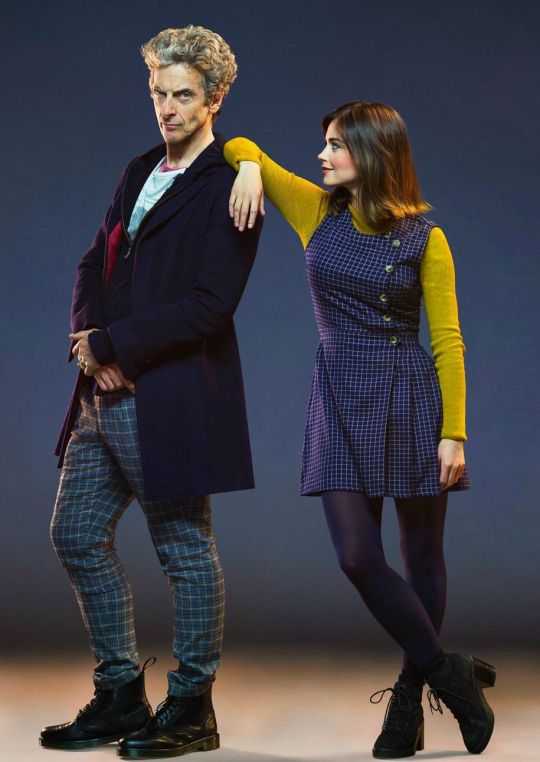
My word, where did 10 years ago?
Ten years ago on Aug. 23, the episode Deep Breath launched the remarkable era of Peter Capaldi as the Twelfth Doctor (or true Thirteenth if you want to annoy some people).
And it was the true launch of one of the most interesting romances in sci-fi (friendly reminder that Peter, Jenna Coleman, Steven Moffat, writers and directors have all in some way or another confirmed that this wasn't fans watching with "ship-coloured glasses" - it was canonical. Regardless how some fans and even media have tried - as recently as a few days ago - to pretend it didn't exist.)
I do think it was not intended. It cannot be denied that a lot of people consider there to be an age-gap limit in romances, real-life and fictional, even when both parties are consenting adults. So when Peter replaced Matt - and no one can deny Clara had the hots for Eleven because she flat out says so, several times - they obviously planned on a return to the First Doctor-Susan dynamic with Capaldi (or maybe more accurately Third Doctor-Jo Grant, since Three low-key held a flame for Jo, since Twelve would still remember how he felt as Eleven, plus Three was "Capaldi's Doctor"). But due to the fact Peter and Jenna had such intense chemistry (to this day some fans remain convinced they had a real-life romance, which is not something I ever subscribed to), coupled with the decision to shoot the first episodes of the season in order of broadcast, you can see Moffat and his writers pivoting in real time as they adjusted to the fact that - with no disrespect to Samuel Anderson - Danny Pink was never going to be the next Rory Williams. This is most in evidence with Listen defining a future for Clara and Danny that was definitively retconned by Danny's death in Dark Water.
I know the Capaldi era was not everyone's cup of tea. Season 10 in particular did not age well for me, mainly because it was clearly "one season too many" for Moffat and Capaldi himself seemed to "check out" after a fashion when it became known that the next producer wasn't planning on keeping Twelve around. And if we're going to harp about falling ratings for the show in recent years, Peter never attained the same viewership levels as Matt or David. But for me, Seasons 8 and 9 were - a few off points notwithstanding - the best of the modern era and easily rank alongside the Pertwee years as some of the best this show ever had. (I stopped watching after Season 10 - but having spoken to people whose judgement I trust, I don't think anything that followed is likely to have rendered that statement outdated.)
But I appreciated the more mature approach to the show. Yes, I know DW always was at its core a children's show - though upgraded to family show over time. But having the Doctor and Clara having a mature conversation at the diner, the Doctor inviting a villain to have a drink with him (the closest the Doctor ever got to being James Bond), Clara freaking out about being called a control freak (not to mention her perfect "Nothing is more important than my egomania!"), the fact the episode confirmed that the Doctor did look upon Clara as his girlfriend when he was Eleven, and the fact the episode walks up to ageism and pops it in the nose with Clara being upbraided by Vastra for being ageist because of Twelve no longer being the young man Clara fell for ... all these add up to a remarkable episode and likely the strongest debut story for a Doctor since Spearhead from Space.
Deep Breath also marks the last time we saw the Paternoster Gang on screen. Having praised Moffat for Whouffaldi, now time to aim some criticism his way - he set up a perfect spinoff series (Neve McIntosh is one of my favourite actresses not named Jenna Coleman) and yet never followed through. Say what one might about RTD, we'd have gotten 4 series of Vastra, Jenny and Strax had he been in charge. Big FInish doesn't count though I'm sure Neve and Dan Starkey appreciated the fact they didn't need to put on the makeup all the time! LOL
So happy 10th anniversary to Whouffaldi!
71 notes
·
View notes
Text
Thoughts on Different Types of Representation in Doctor Who (and how fandom responds to it)
So I watched Rogue last night and - okay first, oh my days, absolutely ADORED it, this is definitely my favourite episode of this season, it was just so much FUN and it hooked me right from the start. And then the queerness! I was actually thinking to myself whilst watching it how wonderful it was because it felt like a queer story in a way that wasn't like, showboating about how progressive it was? [editorial aside: this is not comparing it to anything in particular, just a general observation]. The characters were just queer, within this wild and wonderful sci-fi story, but also their queerness wasn't the Only Character Trait they had and their story didn't resolve around their queerness, but their queerness was crucial to the plot in a way that was just lovely to see - and as a writer myself, it's personally the way I love to see our stories being told.
But then I made the mistake of going into the tag - always a foolish thing to do, because for some reason everyone loves to praise this era by criticising the previous era (as if it hasn't been criticised enough...like we know most of y'all hate Chris Chibnall for committing no worse crimes than Moffat and RTD before him...we know). And I found a couple of folks talking about how this episode alone did more for queer representation than the entirety of thirteen's era, whiiiiich at first really Peeved Me Off - like didn't these people understand how important Yaz's arc (especially Eve of the Daleks) was to a LOT of people? But then I was like 'well actually this is interesting', right? Because I think there's two very different kinds of representation going on here - and they're both very important in different ways, but one tends to get lauded as brilliant rep and one always gets put down as not good enough, or even bad rep. And what's the main difference? Whether the characters have a gay kiss or not.
So I just thought I'd share some of my thoughts and feelings on this, and why I think both these kinds of rep are equally important! To be clear from the get-go though - this is definitely not me ragging on anyone who likes more about one than the other (in fact, I think everyone likes one more than the other). This is merely a personal essay about it and the frustrations that comes when people in general do lift one up over the other. I'm gonna put it under the cut though, because it might get a bit long!
So, back when Eve of the Daleks aired, I remember having a lot of conversations about the representation in that episode - in particular with a very good friend of mine, who is a lesbian. And we realised that when it came to rep, we both actually wanted pretty different things. I'm aroace and genderfluid, and so a lot of what I saw in how thirteen was written - especially in terms of her gender (or lack thereof), and also her apparent lack of attraction (at least, in how I read it) was just incredibly affirming to me. I've never EVER seen a character on screen that I could see myself in both in terms of sexuality and gender. Whereas my friend saw things quite differently - thirteen was a lesbian, and they wanted to see that kiss between these two characters, because for them too, it was so rare to see that, and, in their words, they wanted to have their cake and eat it too. And we both realised that the reason that queer representation can feel so intense and important is, simply, because there isn't enough of it. We're all desperately reaching for the same small portion - and none of it is ever going to please everyone, or resonate with everyone. The stakes are too high.
So then, when there wasn't this dramatic romantic ending to Yaz's story, when there was no queer kiss, I was very sad for my friend, who didn't get that representation, but so painfully relieved for myself - because I got mine. So then it sucked a lot to see a lot of people getting really angry that this wasn't queer representation, that this was even homophobic - I even had someone tell me that aromantic representation in this regard was always going to be homophobic, because no-one would ever write it to be aro rep, and would instead only ever write it to avoid writing a gay kiss. And the thing that got me the most was that, REGARDLESS of whether they kissed or not, regardless of how you read either of the characters, there was one thing that was certain:
Yaz was queer. In text. Her emotional plotline centred around her realising that she was attracted to the Doctor (who was presenting as a woman - although, again, I don't think she really identified as such). The fact that she and the Doctor didn't get together by the end does not erase that fact.
They didn't kiss - but so what? Are queer people only queer when they're kissing someone of the same gender, or having gay sex? Are queer people not queer in their day to day lives, when they're not doing any of those things? Are queer people not queer when they're not dating? Are queer people not queer when they're trans, when they're ace, when they're aro, when their queerness doesn't resolve around attraction to the same gender?
And, to be honest, I think a lot of my feelings around this stem from the sort of exclusionist rhetoric that we saw a LOT of towards the ace/aro community back in 2012 that we still see now, that we're seeing towards the trans community now, that we're still seeing towards bi people, for pete's sake. It's this in-community infighting, pushing each other down to try and get up to the top, to keep all the "resources" for "the people who really need it", and it causes a serious amount of harm - but the truth is (and to bring this back to doctor who) that it all comes back to what me and my friend were discussing. We're all scared, all desperate to be seen - and when we are seen, it's the most incredible experience and the idea of losing that (or having someone else undermine it) feels inexpressibly awful. Having the thirteenth doctor...I suddenly realised this is what all the straight cis white dudes get all the time. She was like me, and that was indescribable. And then losing her - and having RTD not even be able to have a man wear her clothes because he was too worried about what the tabloids would say to be able to show a gnc person on tv...and then constantly described her as The Woman Doctor for the next entire episode - that hurt. A lot.
I've spoken to other friends who felt so seen in the character of Yaz - those people who realised they were queer later in life, those who fall in love with people and it doesn't end up going anywhere, those who don't get the whirlwind queer romances that people often call 'good representation'. Myself and many of my aspec friends have felt so seen in thirteen's almost entirely romance-less arc, and myself and my trans/genderqueer friends felt very seen in the way that thirteen's character would have been exactly the same if she'd been a man - the only difference was how the other characters around her interacted with her. Gender was something that happened to her. And when I watch episodes like Rogue, even though I don't relate to that representation, I just feel overwhelmed with joy because I know how important it will be to others that I care about. I think my sadness then comes from the fact that the way Thirteen and Yaz were written are just as important to me and many people that I know, but because they didn't kiss, it's not considered queer enough. Am I not queer enough, then? Are my friends not queer enough?
We need more episodes like Rogue, like The Parting of Ways, like Praxeus, like The Doctor Falls, because they are unquestionably and unapologetically queer, in a way that can't be avoided. We also need more episodes like Eve of the Daleks, like The Haunting of the Villa Diodati, like the rest of thirteen's era where the representation is an undercurrent throughout the whole story - but also undeniable, in a way that Yaz's story arc is, even if it doesn't end in a kiss, even if it doesn't end neatly and happily. Personally, I definitely would love to see more stories focused on aromanticism and on transness (especially ones that are written by trans people for trans people, rather than by cis people for cis people), but that's probably going to be down to people like me and other writers that I know actually getting into the script writing industry - and that depends on the people who are already there letting us in. One thing that I've always appreciated about Chibnall is that, after leaving Doctor Who, he began a programme for training up new showrunners with ITV, because: "showrunners are the gatekeepers and too many of the gatekeepers look like me."
Anyway, I probably have more thoughts that I've forgotten, but that's generally the gist of it. I think the more we fight over whether rep is 'good' or 'bad', relating to whether we see ourselves in it or not (rather than 'is this genuinely harmful or unhelpful', which I think is a more crucial question) the more the waters get muddied. We have different needs and wants, and no single episode is going to represent every facet of our community. But each episode, each story like this is a step in the right direction - and even rep that isn't perfect (I have thoughts about The Star Beast, for example) is still extremely positive and important, and definitely something that should be celebrated, even as we keep looking to the future for what we would like to see done differently, done better. And some day, I hope, there'll be so much queer rep, it'll be so normal, that those stakes won't feel so high anymore. It won't feel like everything hangs on how a certain show or storyline or episode is written. We'll all be seen. And that will be absolutely fantastic.
#taka rambles#doctor who#fifteenth doctor#doctor who spoilers#dw rogue#ncuti gatwa#the doctor#fifteen#lgbt+#queer#so to be clear BOTH KINDS OF REP ARE IMPORTANT BOTH ARE GOOD#WE NEED BOTH#and some people will like one more than the other#the issue I have is when people act like one kind is lesser#anyway!!#really REALLY loved this episode#i also have a lot of thoughts about like...queer characters being mentioned in the background?#I think that's cool and important but it's frustrating when that's the only rep we get#half formed characters in the background who get mentioned once#i think fundamentally that the aro/ace/trans/genderqueer crowd (sweeping generalisation incoming)#need different things to the wlw/mlm crowd#which is not a bad thing until people start acting like one is more important than the other#they're both important!#and in fact there are people who fall into both categories so SKSKS
125 notes
·
View notes
Text
“But We Love Martha Jones!” - The Doctor Who Fandom’s Selective Memory of Racism
Be aware that this article contains explicit examples of anti-black racism and misogynoir.
Chapter 2 - Utopia-ish
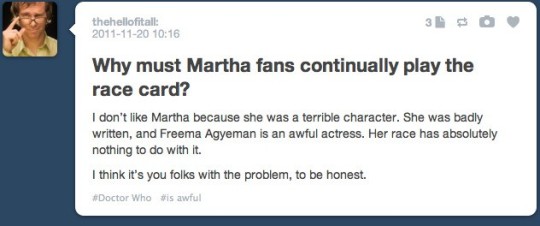
The constant nitpicking of Martha Jones for reasons white female companions could get away with was blatant anti-black racism. Let’s get that bit clear first and foremost. As a Black person in fandom, watching Black characters get torn apart while never being given the grace of their non-Black castmates is an experience that’s too common. Microaggressions are more subtle so the easiest way to shut down any mentions of racism is to accuse Black fans of making things up or telling us “Well it’s not like REAL racism”. Luckily Doctor Who Tumblr birthed the Martha Jones affirmative action and Aunt Jemima “memes” so I can cross both covert and overt racism off the list. As mentioned in extensive detail in the previous chapter, plus the various Martha Jones articles written before me, the treatment Martha experienced was racist. I don’t care if you personally didn’t like her. I don’t care that you missed Rose. I don’t care that Ten is your smol bean. Martha’s treatment was racist. Freema Agyeman’s treatment was racist. It might not have been everyone. It might not have been you personally. But it was there. The fandom can never be a safe space for POC, specifically Black people if this elephant in the room can’t be addressed over a decade after it arrived.
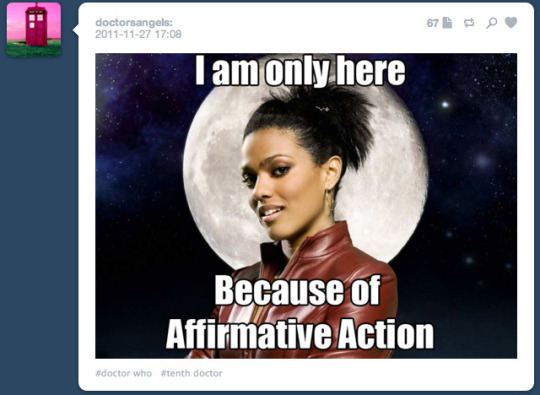
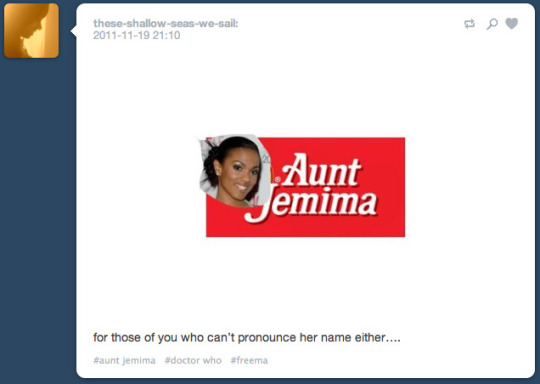
On paper, you’d assume Martha’s rep was good because “at least she wasn’t a Black stereotype”. Some fans praised her for having a present father, not speaking MLE and not being from the ends. This goes into respectability politics but the fandom’s weirdness about Black Brits and class is not the point of this article. The point is the revisionist history of how Martha was really treated and to do that it helps to know what Black tropes are. The Mammy trope is a Black woman whose main purpose is to serve her white counterparts and during slavery, she mainly cared for the slave owners' children. She is usually fat, dark skin and asexual, not as a representation of those things but as a statement of how if she isn’t used for sexual exploitation like the Jezebel (the promiscuous, reckless, sexualised Black woman), she has no sexual value at all. Her value is serving the needs of others only. Martha doesn’t fit this trope in theory but in practice, she fulfils the sub-categories of this trope both in show and fandom: the disposable Black (girl)friend trope. She is used as Ten’s emotional punching bag before he’s ready for Donna and then Rose again. She had to endure edgy moody S3 Ten so no one else had to. She’s the excuse people use to deflect any critical analysis of how race was handled in RTD1. She’s the fandom’s excuse to deflect from their own racial biases. Racism? No way! Everybody loves Martha Jones! What do you mean?

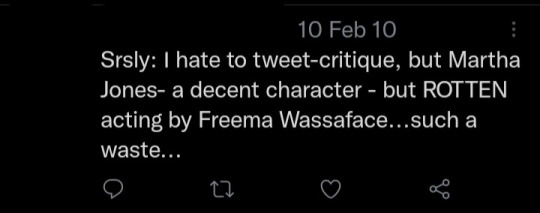
Some parts of the fandom have tried to mend things by suggesting Martha be paired with other doctors or romantically shipping her with other characters a bit better than Mickey Smith. But does this hold up? As much as I’m a big fan NineMartha as a concept and as someone who honestly saw one-off characters like Riley Vashtee from 42 or Tallulah from Daleks in Manhattan having way more romantic chemistry with Martha than Mickey ever did, simply re-shipping Martha isn’t enough. Doctor Who’s racism isn't exclusive to one doctor, one series or one era and new Martha pairings suggest the issue was “right person, wrong doctor” instead of what the issue actually was: racism. Moffat and Chibnall’s eras weren’t full of golden Black representation either so I doubt the Martha issue would’ve magically disappeared under those two. From Nine’s hostility to Mickey, to Twelve’s hostility to Danny Pink to Thirteen handing a South Asian Spymaster to the Nazis and Eleven only travelling with POC in comics most fans haven’t heard of and being besties with Churchill, simply putting Martha with another Doctor isn’t the serve fans think it is. Even RoseMartha seems like putting a bandaid on a bullet hole. If it's not enough for Martha to be compared to Rose, put down in favour of Rose, told she isn’t Rose and told she's worse than Rose in fandom and in show over and over and over, she has to be shipped with Rose too. Martha’s a great character… as long as you can tie her to Rose… again. Even in my own article I have to talk about Rose because Rose is centred in what was supposed to be Martha’s story. A doctor-to-be Black girl from London with a hectic family meets a Time Lord and gets abducted by space rhino police at work in one day. Her main conflict isn’t balancing work and time traveller life, or fighting to get her family back together, or seeing what’s out there in the universe - it's that she isn’t “Rose” enough. The Mammy and her sons’ main thing in common is simple; how well they serve and centre the white characters. In attempts to mend Martha’s treatment she is still only valued in relation to white characters. She should’ve been with Eleven because he would’ve fucked a Black woman. Or maybe Dilfy Twelve. Or a sapphic romance with another female companion who she saw twice or doesn’t actually know. Or maybe Ten in an alternate universe where he supports #nubianqueens. None of this is done to explore sexuality or romance with Black women and is definitely not to centre Black lesbianism and bisexuality. It’s Mammy with a dash of Jezebel. It's adding romantic and sexual value on top of physical and emotional value like a crappy meal deal.
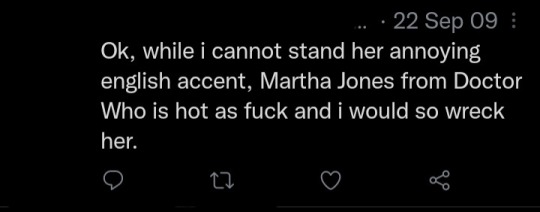
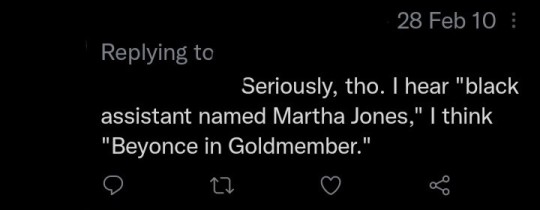
I’m tired of Black women being treated as extensions of white women both in media and in real life. I’m tired of our value being determined by how well we serve white people emotionally, physically, platonically and sexually. And I'm even more tired of white feminism especially in this fandom. It would be so easy to label this article as anti-Rose, anti-Ten or anti-Tenrose to invalidate my whole racial analysis because it's the easy way out. I’ll admit I like both characters individually but not the ship but this isn’t something I decided on since birth - it's my conclusion as a Black fan in a predominantly white fandom, watching a predominantly white show, watching the first companion of my race be told she isn’t good enough compared to the white characters, and that the hatred of her is justified for the greater good of its popular white ship. Black fans can never have this conversation without being told we’re “pitting women against each other” and that Martha and Rose hugged once in S4 so everything's hunky dory. Martha’s happy that Ten found Rose again so what’s the problem? It sends a clear message that Black women’s pain will never matter a much as white women’s feelings. “Rose is amazing! Martha’s amazing! Stop pitting women against women!” but who was pit against who in the first place? These faux girl power posts fail to acknowledge the overlap of race and gender which separates the treatment of Black and white women. It fails to acknowledge Martha’s hate was rooted in anti-black racism. It fails to acknowledge the anti-Rose pushback was in response to how the show and fandom convinced us Rose was the untouchable bar this Black woman failed to meet. It fails to acknowledge Freema Agyeman the actress was targeted not just her character. It fails because the female empowerment rhetoric that leaves the Black ones at the bottom of the pile only “empowers” women of a certain demographic.
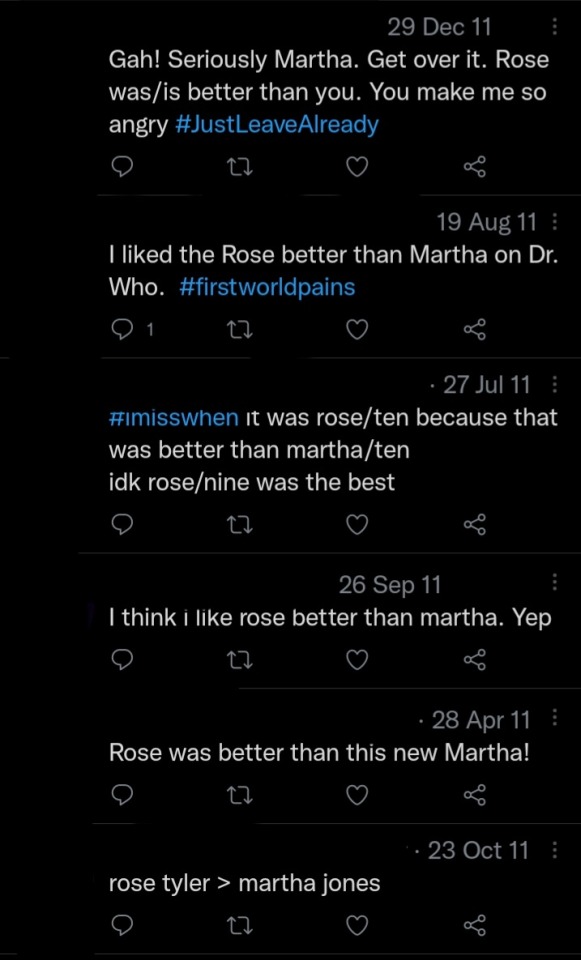
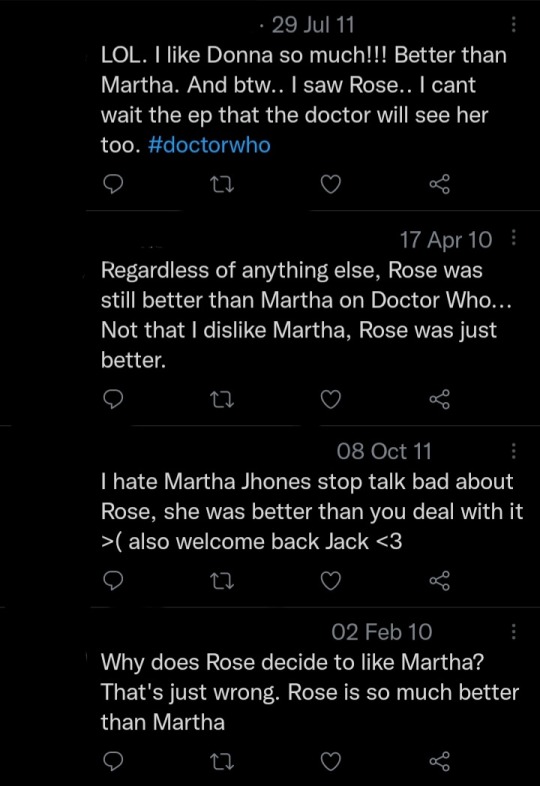
The harassment Martha experienced was swept under the rug of “stan wars” but it was so much deeper than that. I’m not saying Martha stans are angels but there was no “Great Stan War” because the sides were never even. At the end of the day no amount of “Martha’s better than Rose” tweets will ever compare to the fact that Martha hate was rooted in misogynoir. Rose was and still is considered the greatest companion of nuwho, whilst Martha is constantly erased and undervalued. Rose’s video views and hashtags have always been bigger than Martha’s. Amy and Clara came after Martha but still surpassed her in popularity and got plenty of fan edits of “The Girl Who Waited” and “The Impossible Girl” whilst Martha was conveniently skipped in the companion lineup. The fandom’s bias still shines clearly in favour of Rose over Martha. Rose’s jealousy towards other women is justifiable and just the ups and downs of a 19-year-old whilst Martha’s is entitled bitterness. Rose’s flaws are compelling character moments and depth, Martha’s are “holding her back from being a good companion”. Hell, even Donna calling out Ten’s BS was entertaining accountability whilst Martha was just the angry Black woman. Fans will weaponise Rose’s working-class roots to imply a pro-Martha bias, failing to acknowledge the working-class to poor background of the average Black Brit, the anti-blackness middle-class Black people are not spared from, the many working-class Black characters of the show like Mickey, Bill, Rigsy and Ryan or how most fans don’t consider Martha middle class because she doesn’t fit the white British cultural stereotypes. You can't be the most loved and hated at the same time. The hard truth is Billie Piper wasn’t racially abused by Martha stans but Freema was absolutely racially abused by Rose’s and the effects of this are still around. Go into Martha Jones tags today and you’ll see snarky posts of how Ten could never love another companion like Rose. Even when Freema bravely shared her experiences of literal racism, fans were quick to yell “But I wanted Ten and Rose though” as a justification for years of misogynoir. Again, we need to address the elephant in the room instead of covering our eyes and ears to act like it’s not there. A Black character and actress was collateral damage in order for a popular white ship to rise and whilst I’m not an anti, I as a Black Doctor Who fan, I’ll never be a supporter. At the end of the day, only one of these actresses is still carrying the burden of misogynoir over 10 years since RTD1 ended. A lonely walk across the Earth yet again.
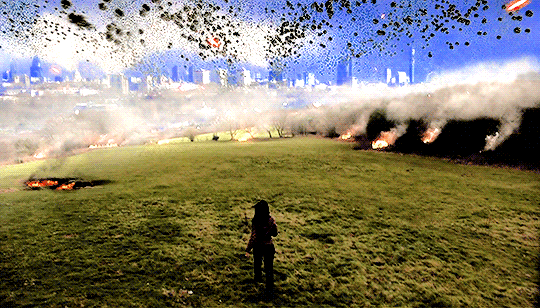
<- Chapter 1
Chapter 3 ->
#martha jones#freema agyeman#doctor who fandom#doctor who#dw fandom#fandom racism#antiblackness#fandom antiblackness#fandom analysis#rose tyler#tenrose#tenmartha#rosemartha#ninemartha#eleven x martha#twelve x martha#marthadonna#thirteenmartha#rtd era#rtd critical#moffat critical#chibnall critical#black representation#new who#dr who fandom#doctor who analysis#rtd#rtd1#fandom history
297 notes
·
View notes
Text
last week the twitter/tumblr fandom were largely absolutely enraptured and falling over themselves with praise for a steven moffat episode i found just ok and this week the fandom is bemoaning and complaining about an rtd episode i thought is likely to be the best of the season. everything old is new again
98 notes
·
View notes
Text
Doctor Who - Opinions
-the ninth doctor was the best. no one will ever be as good as he was
-same for donna, best companion, no one will ever compare
-imo 9th > 10th > 12th > 14th > 11th > 13th (dunno about 15th yet, haven't seen enough of him)
-donna > rose > jack > martha > nardole > bill > river/clara > rory > graham >>>>>>>>>>>>>> amy (idk about yaz and ryan I honestly dont see any distinctive personality traits apart from the fact that ryan is always complaining and generally unpleasant)
-ninerose >>>>>>>> tenrose
-clara is a cool character, it's just her plots that made people dislike her
-i don't get the obsession people have over thoschei. or the master in general and his relationship with the doctor? apart from missy and twelve ofc
-i could never warm up to amy, nor do i get how people can like her. she was abusive, not a girlboss. didn't deserve rory
-i have mixed feelings about river. like obviously, slay my goddess, but also, she's everything that's wrong with moffat's writing of women? she's actually dependant and praises the doctor and never makes a decision for herself? never questions the doctor? that's not ok
-idc how good moffat's storylines get, i'll choose rtd any day. i'll refer you to this post as to why.
-chibnall's era feels flat. i don't hate 13, she's adorable, but I used to laugh and cry several times an episode during the first ten series. now it's like twice a series if we're lucky.
-i liked the campy effects way better than the disney-style expensive cgi they now use to try and balance out mediocre writing (I'm sorry but wtf was that Space babies episode and how did they manage to make it even more cringe than the series one Slitheen two-parters?)
#doctor who#nuwho#doctor who opinions#9th doctor#ninth doctor#donna noble#10th doctor#tenth doctor#11th doctor#eleventh doctor#12th doctor#twelfth doctor#13th doctor#thirteenth doctor#14th doctor#fourteenth doctor#15th doctor#fifteenth doctor#rose tyler#river song#clara oswald#amy pond#anti moffat#rtd era#ninerose#anti disney
45 notes
·
View notes
Text
I can't find the original post and am probably misremembering some of its meaning but I found a post about RTD companions vs Moffat companions and how "relatable" they are and it got me thinking again about that one post about how its more important that characters are resonant rather than relatable. This is a mindset I think could go a long way in how DW fandom perceives and compares companions.
To illustrate my point, let's talk about Rose and Amy.
Rose is consistently praised for being, above most things, relatable. Because she Has A Job and A Family and Went To School and hey, we have jobs and families and go to school, so we can relate to that, right? In a sense, Rose could be us. Now, I'm not going to sit and claim none of this praise is warranted, I think one of the biggest strengths of RTD's era is how it melded the sci-fi wonders of the show with companion's families who feel like characters from a completely different genre, a soap or a sitcom. To quote full-fat videos, Davies achieved a perfect balance between the domestic and the fantastical. However, I also think its worth noting that, after Moffat started leaning more into the fantastical elements of the show, there was a bigger cry from the fandom of "Rose has family, family makes character relatable" which served to erase a lot of the complexities of the Moffat-era companions.
Take Amy for example. Amy was constantly accused of being 'unrelatable', the biggest crime a character can commit apparently because she was "too special" and "we don't know about her family". Ergo, we don't know about her. And yes, you can tell a lot about a character through their family life, RTD did it beautifully, it's not the only way we can learn about a character. We learn about them through how they interact with the world they are in and through their arc.
You can claim Amy isn't relatable, in that she isn't The Everyman like Rose, because she was The Girl Who Waited and grew up with a crack in her wall and we can't relate to that. But... Amy also spends the entire first season running away from adulthood, its her reason for leaving with the Doctor in the first place. Essentially, series five, hell you could argue the entire Pond run, is her coming-of-age story where she finally grows up and accepts that she's an adult now. And that, my friends, is resonant. Only speaking for myself, I find this resonates with me even more at 25 than at 12. Amy's lack of a stable job was criticised again for not being 'relatable', but holy hell does it resonate as a confused millennial in the job market trying to find who I am that Amy spends seasons 6 and 7 constantly switching careers because she can't settle on one that feels like her.
I've made this post longer than it needs to be but my point in a nutshell is that although Amy, Clara and Bill were criticised for not being relatable because they didn't have things like schools and jobs and families, I'd argue they were never meant to be relatable. They were meant to be resonant; you were meant to connect with them, not their circumstances.
#doctor who#amy pond#clara oswald#bill potts#me looking at amy at age 12: hehe i love her!#me looking at amy at age 25; I'm In This Picture And I Don't Like It
116 notes
·
View notes
Text
Do you know what the funniest thing is? Is that Moffat and Gatiss genuinely believe they're geniuses, and they single-handedly wrote the best Sherlock Holmes adaptation ever. They're convinced Sherlock Holmes was nothing before them, and their "improvements" in the stories somehow award them ownership over the character. Like, they genuinely believe they own Sherlock Holmes. To the point that they view any other adaption as a ripoff and WORSE as a personal attack on their show and the character. Like it's so wild to me that in the year of our Lord 2023 (now 2024), Mark Gatiss is still talking shit about Elementary on Tumblr UNDER THE TAG OF THE SHOW. LIKE BITCH MOVE ON. And it's not because he's resentful that Elementary had a mini-revival on Tumblr after Sherlock crashed and burned, with many praising the show for being the better adaptation of the two (which it is). He doesn't even do it out of envy or anything. He'd be required to have at least an ounce of self-reflection and critical thinking to be envious of an objectively better show. No, Gatiss is literally just mad that someone else adapted Sherlock Holmes, period. And that it came out while his show was still on air. He's just pissed that someone else would produce another rendition of the character ("his character") and just automatically assumes it's bad. The level of delusion of these two showrunners is ASTOUNDING. Moffat and Gatiss think they fixed Sherlock Holmes, like he was nothing before them as if the stories were not massively popular and influential before they created the show. They think it's thanks to them that Sherlock Holmes has his status as a cultural icon.
And that's just really sad and pathetic.
#like they're so unserious#sherlock holmes#acd holmes#elementary#elementasquee#bbc sherlock#I crossed out the Gatiss part because it’s incorrect#I apologize for the misunderstanding
76 notes
·
View notes
Text
I know it shouldn't surprise me, but I'm still SHOCKED when I read a fic on Ao3 and then the author will say that they're a middle-aged woman with like 5 kids in the notes and/or comments. No disrespect to them, tho. Bitches with bills to pay and kids to raise writing Johnlock fics better than 99.9% of the shit on booktok deserve nothing but praise. Steven Moffat (derogatory) ain't got nothing on these queens.
395 notes
·
View notes
Text
This might be the smallest of nitpicks i had with Moffat's era, but my mom is a nurse and I was constantly irritated by the implications that being a nurse was less than being a doctor. Nurses do twice the physical work for half the money/praise. They have to have a good bedside manner and should have a certain kindness to them that a Doctor doesn't necessarily have to have.
There was an angle that could have been played in the actual show if the writers were interested in Rory as a character rather than a prop. We got it occasionally like in the doctor's wife with Rory asking how the doctor just moves on from death/closes Idris' eyes, but most of the time it was just played as him being a lesser version of the doctor which irritates me because there is something gendered about the concept of nursing being lesser even though nursing is not a women only field (my uncle is also a nurse).
And I know that Moffat/the writers thought exactly on those lines, like nursing somehow emasculated Rory instead of being a strength, and it would have been SO EASY to make his skill useful (which I think is why I liked the handling of Rory being a nurse the most in 7a which is ironic because I mostly hate 7a but he got to help heal both when it came to his father and in the hospital). There could have been something INTERESTING in the concept of Rory as a caretaker, Rory as the one who heals hands-on, Rory finding a purpose. This TARDIS team could have been equals, but because Rory was only ever a stand-in for the “right sort of man” for the writers, he was never going to be fully-fleshed out & never a true equal to 11amy.
#rory williams#eleventh doctor#meta#11amy#moffat critical#listen gender in moffat's era is covered so extensively with amy and my constant analysises of her but Rory's treatment is gendered too#justice for nursing#Rory as a nurse and Martha as a Doctor are not utilized/explored as well as they should be as parallels/foils to the Doctor#it's about HEALING#about CARING#about teaching the doctor that it is never a crime to take a moment to pay attention to care to help#it's a STRENGTH#(also the Doctor needed to be checked when it came to undervaluing Rory as a nurse/Martha as a Doctor)#NURSING IS NOT LESSER THAN#IT IS EQUALLY IMPORTANT#rory pond#doctor who
27 notes
·
View notes